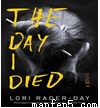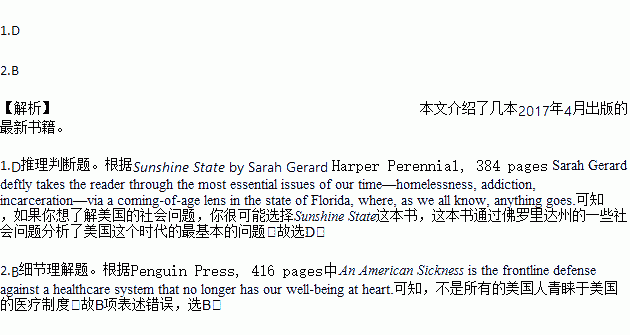题目内容
THE WEEK IN READING: THE BEST NEW BOOK RELEASES FOR APRIL, 2017
Void Star by Zachary Mason
Farrar, Straus and Giroux, 400 pages Zachary Mason creates a world in which the line between human and computer is completely erased, yet he still manages to make the reader feel for all the characters—both man and machine—equally. Add that to a highly addictive plot and an exploration of memory’s impact on our identity, and you’ve got one of the most richly complex novels of the year. |
An American Sickness: How Healthcare Became Big Business and How You Can Take It Back by Elisabeth Rosenthal
Penguin Press, 416 pages It’s not uncommon to come across a complete takedown of the American healthcare system as it stands today. But what is uncommon is what Elisabeth Rosenthal has done in this must-read exploration of what we are (and aren’t) doing right: She has the answers we’ve all been searching for in a potential post-Obamacare world. An American Sickness is the frontline defense against a healthcare system that no longer has our well-being at heart. |
A History of Violence: Living and Dying in Central America by ?scar Martínez Verso, 288 pages
El Salvador and Honduras have had the highest homicide rates in the world over the past ten years, with Guatemala close behind. Every day more than 1,000 people—men, women, and children—flee these three countries for North America. Step outside yourself for a couple hours and immerse yourself in one of the most incredibly vivid, well-reported journeys through Central America that you will ever experience. |
Sunshine State by Sarah Gerard Harper Perennial, 384 pages
Sarah Gerard deftly takes the reader through the most essential issues of our time—homelessness, addiction, incarceration—via a coming-of-age lens in the state of Florida, where, as we all know, anything goes. |
The Day I Died by Lori Rader-Day William Morrow Paperbacks, 432 pages
An incredibly complex and smart novel, The Day I Died contains all the features of a small-town murder mystery but takes it one step further with a narrative about a woman’s unbreakable search for the answers to not just a crime but about her own identity. |
1.If you want to know about social problems in the US, you will probably choose _______.
A. Void Star B. A History of Violence
C. The Day I Died D. Sunshine State
2.Which statement is NOT true according to these books?
A. Void Star is a science fiction with a highly addictive plot.
B. The American healthcare system is favored by all Americans.
C. A History of Violence perhaps involves violence problems.
D. The Day I Died is a novel not only about a murder mystery.
 夺冠训练单元期末冲刺100分系列答案
夺冠训练单元期末冲刺100分系列答案 新思维小冠军100分作业本系列答案
新思维小冠军100分作业本系列答案 名师指导一卷通系列答案
名师指导一卷通系列答案





